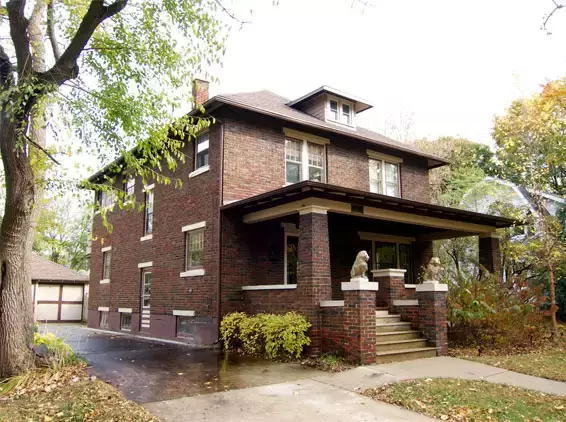
Empty Nester Report
Empty Nester: How to Sell the Place You Call Home Are you an “Empty Nester” who needs a home for the future? Is it time to downsize or to move into another home more suitable for your glorious retirement years? Like thousands of homesellers, you may be discovering that after years of non-stop child traffic in and out of your doors, toys on the floor, music floating throughout, suddenly you can hear a pin drop over the quiet hum of the refrigerator. Your rooms are filled with pictures and memories of this wonderful time in your life, but there are many empty rooms gathering dust now that your children have moved on. The freer years ahead are exciting ones to look forward to, and it may be time for you to move as well. If you find yourself in this situation, you’re in vast and good company. And what that means is that there are many wonderful opportunities for you to create this new chapter in your life . . . if you know what it takes to get the most out of the equity you’ve built up in your current home. To help you understand the issues involved in making such a move, and how to avoid the most common and costly mistakes most Empty Nesters make, we’ve prepared this special report to help you identify and plan for the move ahead. Selling your home is one of the most important steps in your life. This 9 step system will give you the tools you need to maximize your profits, maintain control, and reduce the stress that comes with the homeselling process: 1. Know why you’re selling, and keep it to yourself The reasons behind your decision to sell affect everything from setting a price to deciding how much time and money to invest in getting your home ready for sale. What’s more important to you: the money you walk away with, the length of time your property is on the market or both. Different goals will dictate different strategies. However, don’t reveal your motivation to anyone else or they may use it against you at the negotiating table. When asked, simply say that your housing needs have changed. 2. Do your homework before setting a price Settling on an offering price shouldn’t be done lightly. Once you’ve set your price, you’ve told buyers the absolute maximum they have to pay for your home, but pricing too high is as dangerous as pricing too low. Remember that the average buyer is looking at 15-20 homes at the same time they are considering yours. This means that they have a basis for comparison, and if your home doesn’t compare favorably with others in the price range you’ve set, you won’t be taken seriously by prospects or agents. As a result, your home may sit on the market for a long time and, knowing this, new buyers will think there must be something wrong with your home. 3. Find Out What Other Homes are Selling For (In fact, your agent should do this for you). Find out what comparable homes in your own and similar neighborhoods have sold for in the past 6-12 months, and research what current homes are listed for. That’s certainly how prospective buyers will assess the worth of your home. 4. Find a “good” real estate agent to represent your needs Nearly three-quarters of homeowners claim that they wouldn’t use the same realtor who sold their last home. Dissatisfaction boils down to poor communication which results in not enough feedback, lower pricing and strained relations. 5. Maximize your home’s sales potential Each year, corporate North America spends billions on product and packaging design. Appearance is critical, and it would be foolish to ignore this when selling your home. You may not be able to change your home’s location or floor plan, but you can do a lot to improve its appearance. The look and feel of your home generates a greater emotional response than any other factor. Before a showing clean like you’ve never cleaned before. Pick up, straighten, unclutter, scrub, scour and dust. Fix everything, no matter how insignificant it may appear. Present your home to get a “wow” response from prospective buyers. Allow the buyers to imagine themselves living in your home. The decision to buy a home is based on emotion, not logic. Prospective buyers want to try on your home just like they would a new suit of clothes. If you follow them around pointing out improvements or if your decor is so different that it’s difficult for a buyer to strip it away in his or her mind, you make it difficult for them to feel comfortable enough to imagine themselves an owner. 6. Make it easy for prospects to get information on your home You may be surprised to know that some marketing tools that most agents use to sell homes (eg. traditional open houses) are actually not very effective. In fact only 1% of homes are sold at an open house. Furthermore, the prospects calling for information on your home probably value their time as much as you do. The last thing they want to be subjected to is either a game of telephone tag with an agent, or an unwanted sales pitch. Make sure the ads your agent places for your home are attached to a 24 hour prerecorded hotline with a specific ID# for your home which gives buyers access to detailed information about your property day or night 7 days a week without having to talk to anyone. It’s been proven that 3 times as many buyers call for information on your home under this system. And remember, the more buyers you have competing for your home the better, because it sets up an auction-like atmosphere that puts you in the driver’s seat. 7. Know your buyer In the negotiation process, your objective is to control the pace and set the duration. What is your buyer’s motivation? Does s/he need to move quickly? Does s/he have enough money to pay you your asking price? Knowing this information gives you the upper hand in the negotiation because you know how far you can push to get what you want. 8. Make sure the contract is complete For your part as a seller, make sure you disclose everything. Smart sellers proactively go above and beyond the laws to disclose all known defects to their buyers in writing. If the buyer knows about a problem, s/he can’t come back with a lawsuit later on. Make sure all terms, costs and responsibilities are spelled out in the contract of sale, and resist the temptation to diverge from the contract. For example, if the buyer requests a move-in prior to closing, just say no. Now is not the time to take any chances of the deal falling through. 9. Don’t move out before you sell Studies have shown that it is more difficult to sell a home that is vacant because it looks forlorn, forgotten, simply not appealing. It could even cost you thousands. If you move, you’re also telling buyers that you have a new home and are probably highly motivated to sell fast. This, of course, will give them the advantage at the negotiating table.

6 Buyer Mistakes
6 Things You Must Know Before You Buy Mortgage Regulations Have Changed . . . Mortgage regulations have changed significantly over the last few years, making your options wider than ever. Subtle changes in the way you approach mortgage shopping, and even small differences in the way you structure your mortgage, can cost or save you literally thousands of dollars and years of expense. Get the Right Information Whether you are about to buy your first home, or are planning to make a move to your next home, it is critical that you inform yourself about the factors involved. Industry research has revealed that there are 6 common mistakes that most homebuyers make in mortgage shopping that can have a significant impact on the outcome of this critical negotiation. If handled correctly, these issues could result in a mortgage that will cost you less over a shorter period of time. 6 Things You Must Know Before Obtaining a Mortgage Before you commit your hard earned dollars to monthly mortgage payments, consider these 6 issues. Effective consideration of these important areas can make your payments work much harder for you. 1. You can, and should, get preapproved for a mortgage before you go looking for a home. Preapproval is easy, and can give you complete peace-of-mind when shopping for your home. Your local lending institution can provide you with written preapproval for you at no cost and no obligation, and it can all be done quite easily over-the-phone. More than just a verbal approval from your lending institution, a written preapproval is as good as money in the bank. It entails a completed credit application, and a certificate which guarantees you a mortgage to the specified level when you find the home you’re looking for. 2. Know what monthly dollar amount you feel comfortable committing to. When you discuss mortgage preapproval with your lending institution, find out what level you qualify for, but also pre-assess for yourself what monthly dollar amount you feel comfortable committing to. Your situation may give you a preapproval amount that is higher (or lower) than the amount of money you would want to pay out each month. By working back and forth with your lending institution to determine what this monthly amount is, and what value of home this translates into at today’s rates, you won’t waste time looking at homes that are not in your price range. 3. You should be thinking about your long term goals, and expected situation, to determine the type of mortgage that will best suit your needs. There are a number of questions you should be asking yourself before you commit to a certain type of mortgage. How long do you think you will own thishome? What direction are interest rates going in, and how quickly? Is your income expected to change (up or down) in the near term, impacting how much money you can afford to pay to your mortgage? The answers to these and other questions will help you determine the most appropriate mortgage you should be seeking. 4. Make sure you understand what prepayment privileges and payment frequency options are available to you. More frequent payments (for example weekly or biweekly) can literally shave years off your mortgage. Simply by structuring your payments so that theycome out more frequently, will significantly lessen the amount of interest that you will be charged over the term. For the same reason, authorized prepayment of a certain percentage of your mortgage, or an increase in the amount you pay monthly, will have a major impact on the number of years you will have to pay and could shorten your payment term considerably These two payment options can cut years off your mortgage, and save you thousands of dollars in interest. However, not every mortgage has these prepayment privileges built in, so make sure you ask the proper questions. 5. Ask if your mortgage is both portable and/or assumable. A portable mortgage, where available, is one that you can carry with you when you buy your next home and avoid paying any discharge penalties. This means that you will not have to go through the entire mortgage process again unless you are making a move up to a much more expensive home. An assumable mortgage is one that the buyer for your home can take over when you move to your next home. This can be a very powerful tool at the negotiating table making it much easier and more desirable for a buyer to buy your home, and again saves you any discharge penalties. 6. You should seriously consider dealing with a Mortgage Expert. Consider dealing only with a professional who specializes in mortgages. Enlisting their services can make a significant difference in the cost and effectiveness of the mortgage you obtain. For example they can make the process faster thereby avoiding costly delays. Typically there is no cost or obligation to enquire.

10 Questions to Ask Before You Hire an Agent
10 Questions to Ask Before You Hire an Agent 10 Things You Need to Know Before You Hire an Agent Not all real estate agents are the same. If you decide to seek the help of an agent when selling or buying your home, you need some good information before you make any moves. An agent can cost or save you thousands of dollars Picking an agent is one of those critical issues that can cost or save you thousands of dollars. There are very specific questions you should be asking to ensure that you get the best representation for your needs. Some agents may prefer that you don’t ask these questions, because the knowledge you’ll gain from their honest answers will give you a very good idea about what outcome you can expect from using this agent. And let’s face it - in real estate, as in life - not all things are created equal. Hiring a real estate agent is just like any hiring process - with you on the boss’s side of the desk. It’s critical that you make the right decision about who will handle what is probably the single largest financial investment you will ever make. 1. What makes you different? Why should I list my home with you? It’s a much tougher real estate market than it was a decade ago. What unique marketing plans and programs does this agent have in place to make sure that your home stands out favorably versus other competing homes? What things does this agent offer you that others don’t to help you sell your home in the least amount of time with the least amount of hassle and for the most amount of money? 2. What is your company’s track record and reputation in the market place? It may seem like everywhere you look, real estate agents are boasting about being #1 for this or that, or quoting you the number of homes they’ve sold. If you’re like many homeowners, you’ve probably become immune to much of this information. Afterall, you ask, “Why should I care about how many homes one agent sold over another. The only thing I care about is whether they can sell my home quickly for the most amount of money.” Well, because you want your home sold fast and for top dollar, you should be asking the agents you interview how many homes they have sold. I’m sure you will agree that success in real estate is selling homes. If one agent is selling a lot of homes where another is selling only a handful, ask yourself why this might be? What things are these two agents doing differently? You may be surprised to know that many agents sell fewer than 10 homes a year. This volume makes it difficult for them to do full impact marketing on your home, because they can’t raise the money it takes to afford the advertising and special programs to give your home a high profile. Also, at this low level, they probably can’t afford to hire an assistant, which means that they’re running around trying to do all the components of the job themselves, which means service may suffer. 3. What are your marketing plans for my home? How much money does this agent spend in advertising the homes s/he lists versus the other agents you are interviewing? In what media (newspaper, magazine, TV etc.) does this agent advertise? What does s/he know about the effectiveness of one medium over the other? 4. What has your company sold in my area? Agents should bring you a complete listing of both their own, and other comparable sales in your area. 5. Does your Broker control your advertising or do you? If your agent is not in control of their own advertising, then your home will be competing for advertising space not only with this agent’s other listings, but also with the listings of every other agent in the brokerage. 6. On average, when your listings sell, how close is the selling price to the asking price? This information is available from the Real Estate Board. Is this agent’s performance higher or lower than the board average? Their performance on this measurement will help you predict how high a price you will get for the sale of your home. 7. On average, how long does it take for your listings to sell? This information is also available from the Real Estate Board. Does this agent tend to sell faster or slower than the board average? Their performance on this measurement will help you predict how long your home will be on the market before it sells. 8. How many Buyers are you currently working with? Obviously, the more buyers your agent is working with, the better your chances are of selling your home quickly. It will also impact price because an agent with many buyers can set up an auction-like atmosphere where many buyers bid on your home at the same time. Ask them to describe the system they have for attracting buyers. 9. Do you have a reference list of clients I could contact? Ask to see this list, and then proceed to spot check some of the names. 10. What happens if I’m not happy with the job you are doing to get my home sold? Can I cancel my listing contract? Be wary of agents that lock you into a lengthy listing contract which they can get out of (by ceasing to effectively market your home) but you can’t. There are usually penalties and broker protection periods which safeguard the agent’s interests, but not yours. How confident is your agent in the service s/he will provide you? Will s/he allow you to cancel your contract without penalty if you’re not satisfied with the service provided? Evaluate each agent’s responses to these 10 questions carefully and objectively. Who will do the best job for you? These questions will help you decide.
Categories
Recent Posts










